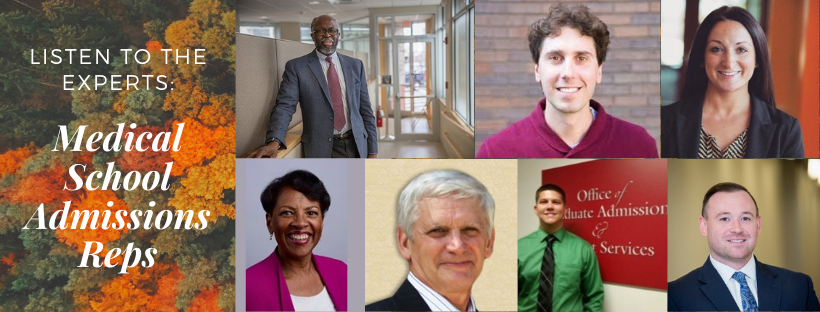
On Tuesday, October 8, immediately following the Graduate School Fair, I had the pleasure of moderating a panel featuring seven experts on the medical school admissions process. Based on their extensive experience in healthcare graduate program admissions, the panelists shared some incredibly meaningful information and advice with the students in attendance. For those of you who were not able to attend, I wanted to share some of my key takeaways.
To kick off the panel discussion, Vincent James from the Harvard School of Public Health explained the three main purposes that a medical school application serves:
- To ensure that the program can help the applicant achieve their academic and career goals
- To ensure that the student can do the work required by the program
- To highlight the uniqueness each student will add to the program and cohort
The majority of the panel discussion focused on various application materials, including the personal statement. Brett DiMarzo from Simmons University explained that personal statements are not only a great demonstration of a candidate’s writing skills, but personal statements are also where candidates should be explaining how the structure of the program they are applying to matches their goals.
Lauren Putnam from the MGH Institute of Health Professions said that some key tips for writing strong personal statements include making sure you are answering the question you are being asked and tying what you are writing to the program’s values. She gave the example that MGH values inter-professor learning and team-based practice, so students’ personal statements that integrate those values always draw her attention.
Catherine Hamilton from the Bouvé College of Health Sciences at Northeastern University added that there are many ways to find out what a program’s values are prior to writing your personal statement. Some examples include attending an open house, connecting virtually with an admissions representative, and looking at the program’s website for their mission, vision, and goals. In particular, Catherine said that programs usually have a statement that reads something like “we seek to educate our students in…” that can be especially telling.
We also spoke about letters of recommendation. In general, the panel agreed that each school looks for a unique combination of academic, professional, and personal letters. Dr. Keat Sanford, former admissions staff at the UConn School of Medicine and current Pre-Med Advisor at UConn, said it is important to think ahead about who to ask for letters of recommendation. He added that it is especially important for students to proactively forge strong relationships with faculty because UConn is such a big school.
Lastly, when asked about what underclassmen can do now to help strengthen their medical school applications in a few years, Brian Dixon from Nursing at Regis College recommended shadowing. He explained that shadowing is a great way to test the waters and make sure students have an accurate understanding of the field they are pursuing and whether or not it is a good fit.
Sean Sendall from the Connell School of Nursing at Boston College agreed that shadowing is vital. He explained that it is important to know the career you are pursuing inside and out down so you can honestly articulate why that career is appealing to you. He also suggested informational interviewing over coffee as another way to get to know the field and the opportunities and challenges that come with it.
To find out about future events like this one, keep an eye on the Center for Career Development’s events calendar in Handshake.
